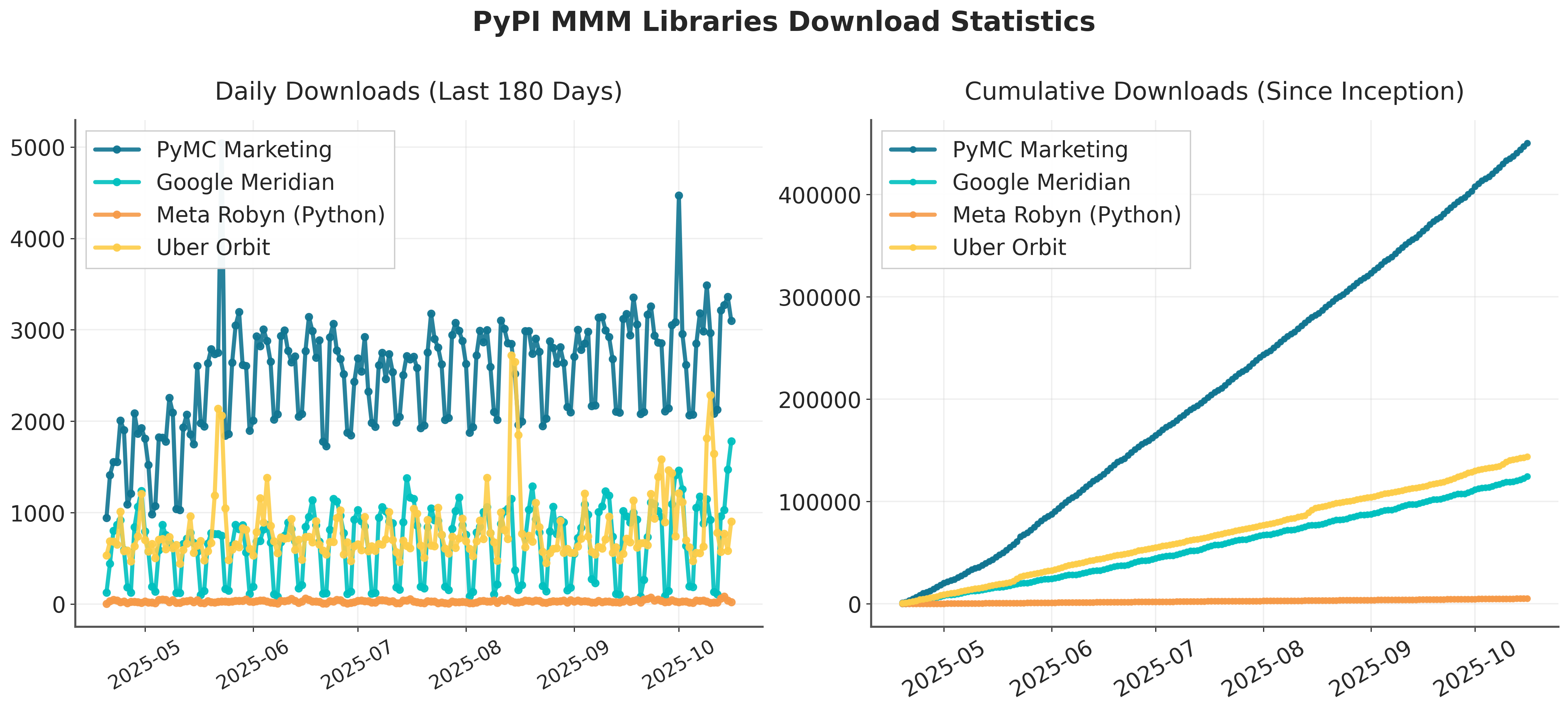How We Compare#
Given the popularity of the Media Mix Modelling (MMM) approach, numerous packages are available. Below is a concise comparison highlighting how the features of PyMC-Marketing stand against other popular options:
Feature |
PyMC-Marketing |
Robyn |
Orbit KTR |
Meridian* |
|---|---|---|---|---|
Language |
Python |
R |
Python |
Python |
Approach |
Bayesian |
Traditional ML |
Bayesian |
Bayesian |
Foundation |
PyMC |
- |
STAN/Pyro |
TensorFlow Probability |
Company |
PyMC Labs |
Meta |
Uber |
|
Open source |
✅ |
✅ |
✅ |
✅ |
Out-of-Sample Forecasting |
✅ |
❌ |
✅ |
❌ |
Budget Optimizer |
✅ |
✅ |
❌ |
✅ |
Time-Varying Intercept |
✅ |
❌ |
✅ |
✅ |
Time-Varying Coefficients |
✅ |
❌ |
✅ |
❌ |
Custom Priors |
✅ |
NA |
❌ |
✅ |
Custom Model Terms |
✅ |
❌ |
❌ |
❌ |
Lift-Test Calibration |
✅ |
✅ |
❌ |
✅ |
Hierachical Geographic Modeling |
✅ |
❌ |
❌ |
✅ |
Standardized Database Connectors |
✅ (with Fivetran) |
❌ |
✅ |
✅ (limited to Google ecosystem) |
Unit-Tested |
✅ |
❌ |
✅ |
✅ |
MLFlow Integration |
✅ |
❌ |
❌ |
✅ |
Multiple Sampling Backends |
✅ |
NA |
❌ |
✅ |
GPU Sampling Acceleration |
✅ |
NA |
❌ |
✅ |
Consulting Support |
Provided by Authors |
Third-party agency |
Third-party agency |
Third-party agency |
*Meridian has been released as successor of Lightweight-MMM, which has been deprecated by Google
Last updated: 2025-10-17
Key Takeaway#
Four of the five major libraries for MMMs implement different flavors of Bayesian models. While they share a broadly similar statistical foundation, they differ in API flexibility, underlying technology stack, and implementation approach.
PyMC-Marketing stands out as the most widely used library by PyPI downloads (see plot below), offering unmatched flexibility and a comprehensive set of advanced features. This makes it ideal for teams looking for a highly customizable, state-of-the-art solution. Its breadth and depth open the door to deeper understanding and mastery for those willing to explore its full capabilities.
However, other libraries have their own strengths — for example, Robyn is popular in the R community and provides extensive tutorials and documentation.
Your optimal choice should depend primarily on:
Your team’s technical expertise
Your primary advertising channels
Preference for an independent open-source solution vs. one sponsored by Ad Networks

Detailed Performance Benchmark#
When it comes to Bayesian Media Mix Modeling the two most used options are PyMC-Marketing and Google Meridian. Our comprehensive technical benchmark comparing PyMC-Marketing against Google Meridian across realistic datasets (from startup to enterprise scale) reveals PyMC-Marketing’s superior performance: 2-20x faster sampling, 40% lower error in channel contribution estimates, and successful scaling to large enterprise datasets where Meridian fails to converge. PyMC-Marketing’s flexible sampling backends (NumPyro, BlackJAX, Nutpie) provide significant advantages over Meridian’s fixed TensorFlow Probability implementation. See our detailed benchmark analysis for complete results and open-source methodology.
Our Recommendation#
Choose Meta Robyn if:#
Your team primarily uses R instead of Python
You prefer a simpler but less rigorous approach than Bayesian Models (Ridge regression)
You want direct integration with Meta/Facebook advertising data
Choose Google Meridian if:#
You want a simplified (albeit less flexible) API to build models across geographies
Direct integration with the Google advertising ecosystem is important
You can allow for reduced predictive accuracy and explainability
Choose PyMC-Marketing if:#
Maximum flexibility for complex, unique business requirements is necessary
You need advanced statistical modeling capabilities (e.g., Gaussian Processes)
Production ready setup and integration into broader data science workflows is important (MLflow)
You prefer independence from major ad publishers and networks
Professional independent consulting support is desirable info@pymc-labs.com
